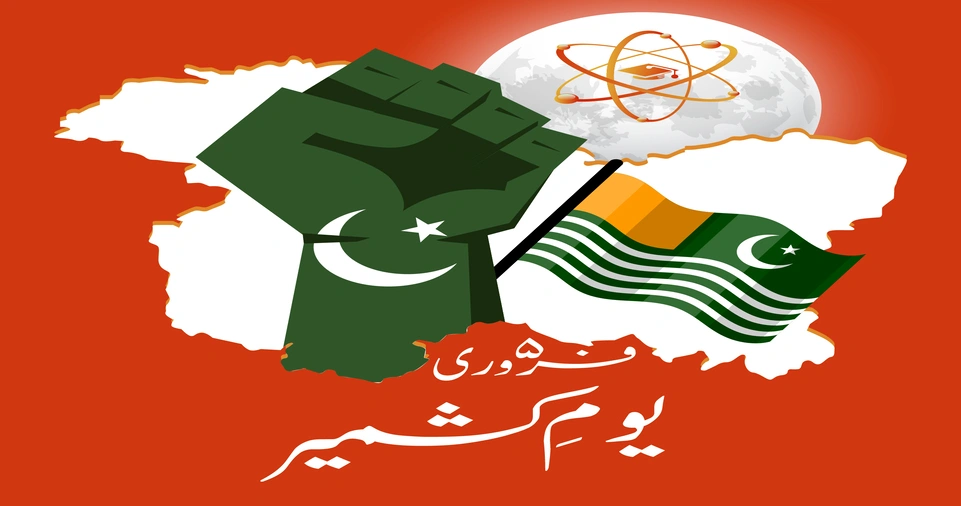Introduction
Kashmir Solidarity Day, observed annually on February 5th, is a day dedicated to expressing support for the people of Jammu and Kashmir. It is primarily observed in Pakistan and among Kashmiri communities worldwide. The day was established to highlight the struggles of Kashmiris and advocate for their right to self-determination. Over the years, the observance of this day has evolved, witnessing phases of rise and decline in its impact and recognition. Although its prominence has varied over time, it remains a symbolic reminder of the ongoing Kashmir conflict and the aspirations of the Kashmiri people.
The Historical Roots of Kashmir Solidarity Day
The Kashmir conflict dates back to 1947, when British India was partitioned into India and Pakistan. The princely state of Jammu and Kashmir, ruled by Maharaja Hari Singh, faced pressure from both sides. Amid an invasion by tribal forces from Pakistan, the Maharaja sought military aid from India and, in return, signed the Instrument of Accession, formally making Kashmir part of India. This led to the first Indo-Pak war (1947-1948) and the establishment of the Line of Control (LoC), dividing the region.
To address the dispute, the United Nations (UN) passed resolutions calling for a plebiscite, allowing Kashmiris to decide their future. However, the referendum was never conducted due to political and strategic complexities, and tensions persisted, leading to multiple wars between India and Pakistan (1965, 1971, and the Kargil conflict in 1999). Over the decades, Kashmir has remained a flashpoint, with both nations staking their claim over the region.
The Emergence of Kashmir Solidarity Day
The idea of Kashmir Solidarity Day was first proposed by Qazi Hussain Ahmed, the leader of Jamaat-e-Islami Pakistan, in 1990. The call for the observance was officially recognized by Prime Minister Benazir Bhutto’s government. Since then, February 5th has been a public holiday in Pakistan, marked by various activities, including:
- Rallies and protests across Pakistan and Azad Jammu & Kashmir (AJK)
- Human chains symbolizing unity with Kashmiris, particularly on key bridges and roads
- Media campaigns highlighting the Kashmir conflict through documentaries, interviews, and special programs
- Special prayers and conferences focusing on Kashmir’s political and humanitarian situation
- International lobbying by Pakistani diplomats to garner global support for the Kashmiri cause
The 1990s saw a surge in Kashmiri resistance against Indian rule, leading to increased global attention on the conflict. The observance of Kashmir Solidarity Day gained traction, with the Pakistani government using diplomatic channels to advocate for Kashmir on international platforms. The day also became significant for Kashmiris themselves, serving as a reminder that their plight had not been forgotten.
The Peak of Kashmir Solidarity Day
The early 2000s and 2010s witnessed the peak of Kashmir Solidarity Day. Several factors contributed to this:
- The Kargil Conflict (1999) – Renewed focus on Kashmir, bringing international attention to the issue.
- Burhan Wani’s Killing (2016) – The death of Kashmiri militant Burhan Wani sparked mass protests in Kashmir, amplifying the observance of February 5th and leading to intensified clashes between Kashmiri protestors and Indian security forces.
- Pakistan’s Diplomatic Efforts – The country intensified lobbying efforts at the United Nations, OIC (Organization of Islamic Cooperation), and other global platforms, calling for intervention and a resolution based on UN resolutions.
- India’s Revocation of Article 370 (2019) – On August 5, 2019, India revoked Jammu and Kashmir’s special status, leading to massive protests and renewed calls for global intervention. Pakistan heightened its Kashmir Solidarity Day observance in response, holding high-level government meetings and international outreach campaigns.
- Social Media Awareness – The rise of digital activism saw an increase in hashtags like #StandWithKashmir and #KashmirBleeds, which helped mobilize global attention.
During this peak period, solidarity events expanded globally, with Pakistan’s embassies organizing seminars, and protests occurring in major cities like London, New York, and Istanbul. The Pakistani government also released postage stamps, coins, and special publications highlighting the Kashmir issue.
The Decline of Kashmir Solidarity Day
While Kashmir remains a significant issue, the observance of Kashmir Solidarity Day has witnessed a decline in recent years. Several factors contribute to this:
- Geopolitical Shifts – The world’s focus has shifted to other conflicts, such as the Russia-Ukraine war and the Israel-Palestine conflict, leading to reduced media attention on Kashmir.
- India-Pakistan Relations – With diplomatic deadlocks and changing international alliances, Kashmir has become less of a priority for some global powers, with many nations reluctant to take a stance.
- Reduced Public Engagement – While Pakistan continues to officially observe February 5th, public enthusiasm and mass mobilization have somewhat declined compared to earlier years. Economic hardships and domestic challenges have also diverted public focus.
- Internal Political Changes – Domestic issues within Pakistan, including economic challenges and political instability, have overshadowed Kashmir-related initiatives. The frequency and intensity of government-backed campaigns have diminished.
Why Is It Still Celebrated?
Despite its decline in prominence, Kashmir Solidarity Day remains significant for several reasons:
- Keeping Kashmir on the Agenda – The observance serves as a reminder of the unresolved Kashmir dispute and continues to call for a resolution.
- Honoring Kashmiri Struggles – The day is used to commemorate those affected by conflicts in the region, particularly those who have lost their lives or suffered due to military crackdowns.
- Diplomatic Significance – Pakistan uses the occasion to renew calls for a UN-backed solution and keep the issue alive in diplomatic circles.
- Cultural and Political Identity – Kashmir remains a key part of Pakistan’s national narrative, and February 5th reflects this commitment, reinforcing national unity on the issue.
- Symbolic Resistance – Even if the day no longer commands the same intensity, it still stands as an annual statement of resistance against Indian control over Kashmir.
Conclusion
Kashmir Solidarity Day has had its highs and lows, reflecting the changing dynamics of the Kashmir conflict. While its impact has diminished over time due to shifting global priorities, the day remains a symbol of Pakistan’s continued stance on Kashmir. Whether it regains its former prominence depends on future geopolitical developments and the evolving Kashmir situation. However, as long as the Kashmir issue remains unresolved, February 5th will continue to be a day of reflection, protest, and advocacy for Kashmir’s right to self-determination.




I am thoroughly impressed with The Ions Secondary School website. The layout is user-friendly and easy to navigate, making it simple to find all the necessary information about the school. The content is informative and well-written, showcasing the school’s commitment to providing quality education to its students. The website truly reflects the school’s values and dedication to academic excellence.
Keep up the great work!